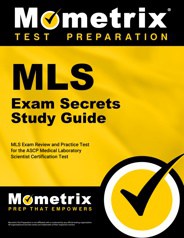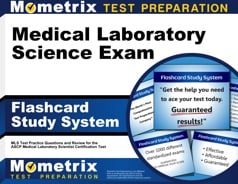The American Society for Clinical Pathology (ASCP) administers the Medical Laboratory Science (MLS) exam for those wishing to obtain a credential as a medical laboratory scientist.
Click “Start Test” above to take a free ASCP Medical Laboratory Science practice test, and check out our premium-quality ASCP Medical Laboratory Science test prep resources by clicking the links below!
ASCP MLS Exam Eligibility
There are five routes to meeting eligibility requirements for this exam. It doesn’t matter which route you choose, but you must meet ALL of the eligibility requirements for a particular route. It is not possible to “mix and match” eligibility requirements.
Route 1
- A baccalaureate degree from a regionally accredited college or university
- Successful completion of a National Accrediting Agency for Clinical Laboratory Sciences (NAACLS) accredited Medical Laboratory Scientist program within the last five years
Route 2
- A valid Medical Laboratory Technician (MLT) American Society for Clinical Pathology (ASCP) certification
- A baccalaureate degree from a regionally accredited college with one semester in microbiology, 16 semester hours in chemistry, and one semester in organic or biochemistry
- Two years of full-time clinical experience* in blood banking, chemistry, hematology, microbiology, immunology, and urinalysis/body fluids in a laboratory within the last five years
*Completion of a NAACLS-accredited MLS program, NAACLS or Accrediting Bureau of Health Education Schools (ABHES)-accredited MLT program, or a foreign medical laboratory science clinical training program within the last five years can be used for one year of clinical experience and one semester of organic or biochemistry.
Route 3
- A baccalaureate degree from a regionally accredited college with one semester in microbiology, 16 semester hours in chemistry, and one semester in organic or biochemistry
- Five years of full-time clinical experience* in blood banking, chemistry, hematology, microbiology, immunology, and urinalysis/body fluids in a laboratory within the last ten years
*Completion of a NAACLS-accredited MLS program, NAACLS or Accrediting Bureau of Health Education Schools (ABHES)-accredited MLT program, or a foreign medical laboratory science clinical training program within the last five years can be used for one year of clinical experience and one semester of organic or biochemistry.
Route 4
This eligibility method is generally for individuals with foreign education and experience.
- A valid Medical Technologist (MT)/MLS (ASCP) certification
- A transcript evaluation verifying equivalency to a US baccalaureate degree from a regionally accredited college or university
- Five years of full-time clinical experience in blood banking, chemistry, hematology, microbiology, immunology, and urinalysis/body fluids in a laboratory within the last ten years
Route 5
This eligibility method is for individuals with military experience.
- Successful completion of a 50-week US military medical laboratory training course within the last ten years
- A baccalaureate degree from a regionally accredited college or university with 16 semester hours in biology, including one semester in microbiology and 16 semester hours in chemistry
- One year of full-time clinical experience in blood banking, chemistry, hematology, microbiology, immunology, and urinalysis/body fluids in a laboratory within the last ten years
ASCP MLS Exam Outline
The Medical Laboratory Scientist exam is a computer-adaptive test (CAT) consisting of 100 multiple-choice questions, and you will be given a 2.5-hour time limit.
The questions on the exam are split into two types: theoretical and procedural.
- Theoretical: These questions measure your ability to apply knowledge effectively, calculate results accurately, and correlate patient results to disease states.
- Procedural: These questions measure your skills in performing laboratory techniques and following quality assurance protocols.
There are seven content areas on the exam:
1. Blood Banking (17%-22%)
These questions assess your knowledge of blood products, group systems, immunology, physiology and pathophysiology, serologic and molecular testing, and transfusion practice.
I. Blood Products
- Donors
- Processing
- Storage
- Blood components
- Blood component quality control
II. Blood Group Systems
- Genetics
- Antigens/Biochemistry
- Role of blood groups in transfusion
III. Blood Group Immunology
- Immune response
- Immunoglobulins
- Antigen-antibody interactions
- Complement
IV. Physiology and Pathophysiology
- Blood physiology
- Coagulation and hemostasis
- Fetus and newborn hemolytic disease
- Anemias
- Transplantation
V. Serologic and Molecular Testing
- Routine tests
- Reagents
- Application of reagents and special tests
- Platelet/Leukocyte testing
- Quality assurance
VI. Transfusion Practice
- Indications for transfusion
- Component therapy
- Adverse transfusion effects
- Apheresis and extracorporeal circulation
- Blood administration
- Patient blood management
2. Urinalysis and Body Fluids (5%-10%)
These questions assess your knowledge of physical and chemical testing, microscopic analysis, physiology, and disease states.
I. Urinalysis
- Physical
- Microscopic
- Chemical
- Renal physiology
- Disease states
II. Body Fluids
- Physical
- Microscopic
- Chemical
- Renal physiology
- Disease states
3. Chemistry (17%-22%)
These questions assess your knowledge of carbohydrates, lipids, heme derivatives, enzymes, proteins, and other nitrogen-containing compounds. Additional topics include acid-base determinations, electrolytes, endocrinology, vitamins and nutrition, therapeutic drug monitoring, and toxicology.
I. General Chemistry
- Carbohydrates
- Heme derivatives
- Lipids
II. Proteins and Enzymes
- Proteins and other nitrogen-containing compounds
- Enzymes
III. Acid-base, Blood Gases, and Electrolytes
- Acid-base determinations
- Electrolytes
IV. Special Chemistry
- Therapeutic drug monitoring
- Endocrinology
- Toxicology
- Vitamins and nutrition
4. Hematology (17%-22%)
These questions assess your knowledge of physiology, disease states, laboratory testing, and hemostasis (including physiology, disease states, and laboratory determinations).
I. Hematology Physiology
- Function
- Production
- Destruction
II. Hematology Disease States
- Leukocytes (WHO classification)
- Erythrocytes
- Platelets
III. Hematology Laboratory Testing
- Hemoglobin
- Cell counts
- Flow cytometry immunophenotyping
- Differentials and morphology evaluation
- Molecular and cytogenic testing
- Hematocrit
- Indices
- Special stains
- Hemolytic indicators
- Other studies
IV. Hemostasis
- Disease states
- Physiology
- Laboratory determinations
5. Immunology (5%-10%)
These questions assess your knowledge of immunology principles, immune system diseases, transplantation, infectious disease serology, serologic procedures, and test results.
I. Principles of Immunology
- Immunoglobulins
- Immune system physiology
- Antigen-antibody interactions
- Complement
II. Diseases of the Immune System
- Hypersensitivity
- Immunodeficiency
- Autoimmunity
- Immunoproliferative diseases
III. Transplantation
- HLA typing
- Graft-vs-host disease
- Tumor immunology
IV. Infectious Disease Serology
- Stages of infection of Treponema pallidum and Borrelia burgdorferi
- Clinical significance and epidemiology of viral pathogens
- Tuberculosis infection
V. Serologic Procedures
- Rheumatoid factor
- Cytokine testing
- ANA
- Immunofluorescence
- Thyroid antibodies
- Nontreponemal syphilis testing
- Labeled immunoassays
- Treponemal syphilis testing
VI. Test Results
- Interpretation
- Confirmatory testing
- Disease state correlation
6. Microbiology (17%-22%)
These questions assess your knowledge of pre-analytic procedures, analytic procedures for bacteriology, and analytic procedures for mycobacteriology, virology, parasitology, and mycology, and post-analytic procedures.
I. Preanalytic Procedures
- Specimen collection and transport
- Specimen processing
- Stain procedures, principles, and interpretations
II. Analytic Procedures for Bacteriology
- Cerebrospinal fluid
- Upper respiratory
- Lower respiratory
- Blood and bone marrow
- Body fluids from normally sterile sites
- Genital tract
- Antimicrobial susceptibility testing and antibiotic resistance
- Gastrointestinal
- MRSA/MSSA, VRE, ESBL/CRE screening
- Skin, soft tissue, and bone
- Urine
- BSL-3 pathogens and select agents (bioterrorism)
III. Analytic Procedures for Mycobacteriology, Virology, Parasitology, and Mycology
- Myobacteriology and Nocardia spp.
- Virology
- Parasitology
- Mycology
IV. Postanalytic Procedures
- Documentation practices
- Critical and urgent value reporting
- Result review and autoverification
- Issuing corrected reports
- Reporting to infection control/prevention and public health
7. Laboratory Operations (5%-10%)
These questions assess your knowledge of quality assessments/troubleshooting, safety, laboratory mathematics, manual and automated methodology and instrumentation, basic management principles, and education principles.
I. Quality Assessment/Troubleshooting
- Preanalytical, analytical, and postanalytical
- Point-of-care testing
- Regulation
- Quality control
- Compliance
II. Safety
- Safety programs and practices
- Emergency procedures
III. Laboratory Mathematics
- Standard curves
- Sensitivity, specificity, and predictive value
- Molarity and normality
- Mean, median, mode and confidence intervals
- Concentration, volume, and dilution
IV. Manual and Automated Methodology and Instrumentation
- Basic laboratory equipment
- Osmometry
- Nephelometry
- Electrophoresis
- Flow cytometry
- Spectrophotometry and photometry
- Chromatography
- Fluorometry
- Mass spectrometry
- Electrochemistry
- Molecular methods
- Hematology instrumentation
- Automated microbiology processors
VI. Education Principles
Check Out Mometrix's MLS Study Guide
Get practice questions, video tutorials, and detailed study lessons
Get Your Study Guide
ASCP MLS Exam Registration
To apply for the exam, you will need to create an ASCP account on their website and fill out the application packet. Once you have submitted the application and the $250 application fee, you will need to then upload any supporting documentation that may be required via the eligibility route you have chosen. ASCP will not notify you of missing documents or discrepancies.
When your application is approved, you will receive an Admission Notice email. When you receive the email, log on to your ASCP account to view your Admission Notice. The notice includes contact information for Pearson Vue to schedule your exam and your exam eligibility period. The exam is conducted at Pearson Vue Test Centers located nationwide and internationally. Most test centers offer appointments Monday through Saturday, holidays excepted.
Test Day
On your test day, you must arrive at the testing center at least 30 minutes before your appointment. Once you arrive, you will be asked to show a form of valid, government-issued photo ID. The facilitator will then inspect your identification, collect your signature and biometric information (using biometric technology), and assign a locker for you to place your belonging in during the exam.
You may have a non-programmable calculator with you at your testing center. Everything else, including your cell phone and keys, must be secured in your assigned locker. Scratch paper or a dry-erase board will be provided for notes.
How the ASCP MLS Exam is Scored
As mentioned previously, the MLS exam is computer-adaptive. Here’s a look at how it works:
The questions on the HT exam are rated on a scale of 100-999. The higher a question is rated, the harder the question is (e.g., a question marked as 566 will be more difficult than a question marked 481).
To pass the exam, your final question must be on or above the 400 mark. If your final question is below this mark, you will not pass the exam, even if you have answered some questions above the 400 mark at some point during the exam. This is because the computer has rated the difficulty of your final question based on how you answered the previous questions.
Receiving Your Scores
Within four business days after taking your exam, you will receive an email notifying you that your results are available in your account. If you need to send your results to a third party, a verification request link is listed on your score report with instructions.
Check Out Mometrix's MLS Flashcards
Get complex subjects broken down into easily understandable concepts
Get Your Flashcards
FAQs
Q
How many questions are on the ASCP MLS exam?
A
There are 100 multiple-choice questions
Q
How long is the ASCP MLS exam?
A
The time limit for the exam is 2.5 hours.
Q
What is the passing score for the ASCP MLS exam?
A
To pass the exam, you will need a minimum scaled score of 400.
Q
How much does the ASCP MLS exam cost?
A
The application fee for the exam is $250.



